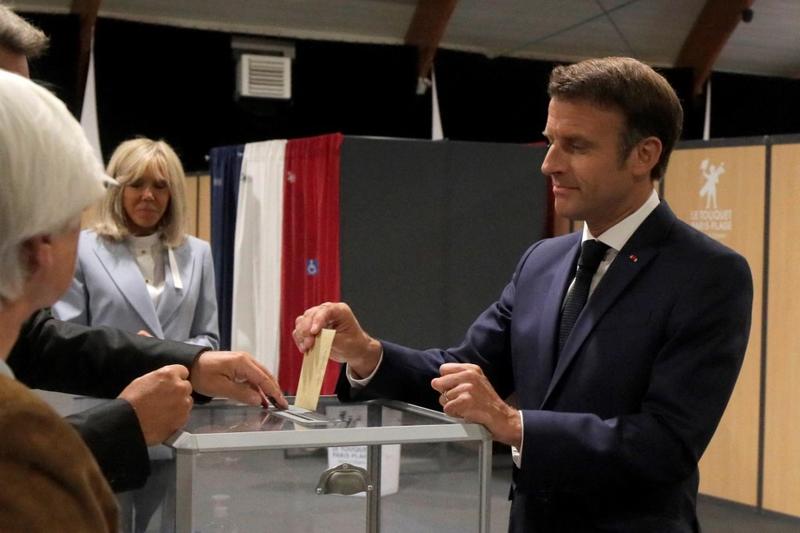 France's President Emmanuel Macron casts his ballot next to his wife Brigitte Macron during the second stage of French parliamentary elections at a polling station in Le Touquet, northern France on June 19, 2022. (MICHEL SPINGLER / POOL / AFP)
France's President Emmanuel Macron casts his ballot next to his wife Brigitte Macron during the second stage of French parliamentary elections at a polling station in Le Touquet, northern France on June 19, 2022. (MICHEL SPINGLER / POOL / AFP)
PARIS - President Emmanuel Macron on Monday was faced with trying to salvage a ruling majority and with it his economic reform agenda after voters punished his centrist 'Ensemble' alliance in France's parliamentary election.
While Ensemble secured the largest number of lawmakers in the 577-seat National Assembly, it fell comfortably short of the threshold required for an absolute majority in a vote that saw a leftwing alliance and the far-right perform strongly.
Final figures showed Macron's centrist camp got 245 seats - short of the 289 needed for an absolute majority.
Finance Minister Bruno Le Maire called the outcome a "democratic shock" and added that if other blocs did not cooperate, "this would block our capacity to reform and protect the French"
The vote was a painful setback for Macron, 44, who was re-elected in April and wants to deepen European Union integration, raise the retirement age and inject new life into France's nuclear industry.
ALSO READ: Macron faces tough battle in French parliamentary elections
Finance Minister Bruno Le Maire called the outcome a "democratic shock" and added that if other blocs did not cooperate, "this would block our capacity to reform and protect the French."
A hung parliament will require a degree of power-sharing and compromises among parties not experienced in France in recent decades.
There is no set script in France for how things will now unfold. The last time a newly elected president failed to get an outright majority in parliamentary elections was in 1988.
"The result is a risk for our country in view of the challenges we have to face," Prime Minister Elisabeth Borne said, while adding that from Monday on, Macron's camp will work to seek alliances.
ALSO READ: French go to polls to give Macron working majority or not
Macron's options include forming a ruling coalition or presiding over a minority government that has to enter into negotiations with opponents on a bill-by-bill basis. The alternative if no agreement can be found is for the euro zone's second biggest economy to be plunged into paralysis. Macron could eventually call a snap election if legislative gridlock ensues.

Macron became in April the first French president in two decades to win a second term, as voters rallied to keep the far-right out of power.
But, seen as out of touch by many voters, he presides over a deeply disenchanted and divided country where support for populist parties on the right and left has surged.
Marine Le Pen's far-right National Rally party won its largest ever representation in the lower house while a resurgent left-wing bloc, Nupes, headed by the hard-left Jean-Luc Melenchon will form the largest opposition force.
"The rout of the presidential party is complete," Melenchon told supporters.
Even so, his own unlikely alliance may now find holding together harder than winning votes.
After a first presidential mandate marked by a top-down government style that Macron himself compared to that of Jupiter, the almighty Roman god, the president will now have to learn the art of consensus-building.
"This culture of compromise is one we will have to adopt but we must do so around clear values, ideas and political projects for France," Le Maire said.
Moderates?
Macron and his allies must now decide whether to seek an alliance with the conservative Les Republicains, who came fourth, or run a minority government that will have to negotiate bills with other parties on a case-by-case basis.
"There are moderates on the benches, on the right, on the left. There are moderate Socialists and there are people on the right who, perhaps, on legislation, will be on our side," government spokeswoman Olivia Gregoire said.
Les Republicains' platform is more compatible with Ensemble than other parties. The two together have a chance at an absolute majority in final results, which requires at least 289 seats in the lower house.
Christian Jacob, the head of Les Republicains, said his party will remain in the opposition but be "constructive", suggesting case-by-case deals rather than a coalition pact.
ALSO READ: Macron's centrists edge ahead of left in French first round vote
The former head of the National Assembly, Richard Ferrand, and Health Minister Brigitte Bourguignon lost their seats, in two major defeats for Macron's camp.
Macron had appealed for a strong mandate during a bitter campaign held against the backdrop of a war on Europe's eastern fringe that has tightened food and energy supplies and sent inflation soaring, eroding household budgets.
Melenchon's Nupes alliance campaigned on freezing the prices of essential goods, lowering the retirement age, capping inheritance and banning companies that pay dividends from firing workers. Melenchon also calls for disobedience towards the European Union.


